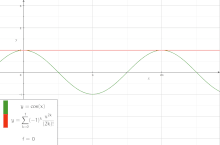Series expansion
This article needs additional citations for verification. (August 2021) |

In mathematics, a series expansion is an expansion of a function into a series, or infinite sum.[1] It is a method for calculating a function that cannot be expressed by just elementary operators (addition, subtraction, multiplication and division).[2]
The resulting so-called series often can be limited to a finite number of terms, thus yielding an approximation of the function. The fewer terms of the sequence are used, the simpler this approximation will be. Often, the resulting inaccuracy (i.e., the partial sum of the omitted terms) can be described by an equation involving Big O notation (see also asymptotic expansion). The series expansion on an open interval will also be an approximation for non-analytic functions.[3][verification needed]
There are several kinds of series expansions, such as:
- Taylor series: A power series based on a function's derivatives at a single point.[1]
- Maclaurin series: A special case of a Taylor series, centred at zero.[citation needed]
- Laurent series: An extension of the Taylor series, allowing negative exponent values.[1]
- Dirichlet series: Used in number theory.[citation needed]
- Fourier series: Describes periodical functions as a series of sine and cosine functions. In acoustics, e.g., the fundamental tone and the overtones together form an example of a Fourier series.[1]
- Newtonian series[citation needed]
- Legendre polynomials: Used in physics to describe an arbitrary electrical field as a superposition of a dipole field, a quadrupole field, an octupole field, etc.[citation needed]
- Zernike polynomials: Used in optics to calculate aberrations of optical systems. Each term in the series describes a particular type of aberration.[citation needed]
- Stirling series: Used as an approximation for factorials.[citation needed]
Examples[]
The following is the Taylor series of :
References[]
- ^ a b c d "Series expansion - Encyclopedia of Mathematics". encyclopediaofmath.org. 7 February 2011. Retrieved 12 August 2021.
{{cite web}}: CS1 maint: url-status (link) - ^ "Series and Expansions". Mathematics LibreTexts. 2013-11-07. Retrieved 2021-12-24.
- ^ Gil, Amparo; Segura, Javier; Temme, Nico M. (2007-01-01). Numerical Methods for Special Functions. SIAM. ISBN 978-0-89871-782-2.
- ^ Weisstein, Eric W. "Exponential Function". mathworld.wolfram.com. Retrieved 2021-08-12.
- ^ "Exponential function - Encyclopedia of Mathematics". encyclopediaofmath.org. 5 June 2020. Retrieved 12 August 2021.
{{cite web}}: CS1 maint: url-status (link)
- Series expansions
- Algebra
- Polynomials
- Mathematical analysis
- Mathematical series
- Mathematics stubs

